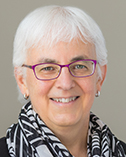
Katharine G. Abraham
University of Maryland, College Park
|
Primary Section: 54, Economic Sciences Membership Type:
Member
(elected 2022)
|
Biosketch
Katharine G. Abraham is an economist known for her work on labor markets and on the measurement of economic activity. The oldest of five siblings, Abraham was born in Dayton, Ohio and spent most of her childhood years in Ames, Iowa. She received a B.S. in economics in 1976 from Iowa State University and Ph.D. in economics in 1982 from Harvard University. Her career has included appointments at the Massachusetts Institute of Technology, the Brookings Institution and, most recently, the University of Maryland, where she has been a member of the faculty since 2002. From 1993 to 2001, she served as Commissioner of the Bureau of Labor Statistics and, from 2011 to 2013, as a member of the President's Council of Economic Advisers. Abraham is a past president of the Society of Labor Economists, chaired the Commission on Evidence-Based Policymaking and is the current Chair of the Conference on Research in Income and Wealth. She is a member of the National Academy of Sciences.
Research Interests
Katharine G. Abraham's research has examined ongoing changes in the labor market and the role of policy in improving employment outcomes. An important thread in her research has been an interest in alternative work arrangements, including employers' motivations for using them and their consequences for workers. A challenge in studying alternative work arrangements has been the paucity of information about them in the surveys economists typically rely on for information about the labor market. Abraham's research has shown how administrative data and better-designed survey questions can contribute to a richer understanding of their evolution and consequences. Abraham also has a continuing interest in the measurement of aggregate labor market conditions. Her work has shown that measures of labor market tightness that consider both unfilled demand (job vacancies) and expanded measures of unutilized supply (including other potential workers in addition to the unemployed) outperform measures based only on the number of unemployed people. Abraham's current research additionally includes work on employment among older adults and the use of new sources of data in the production of official statistics.

